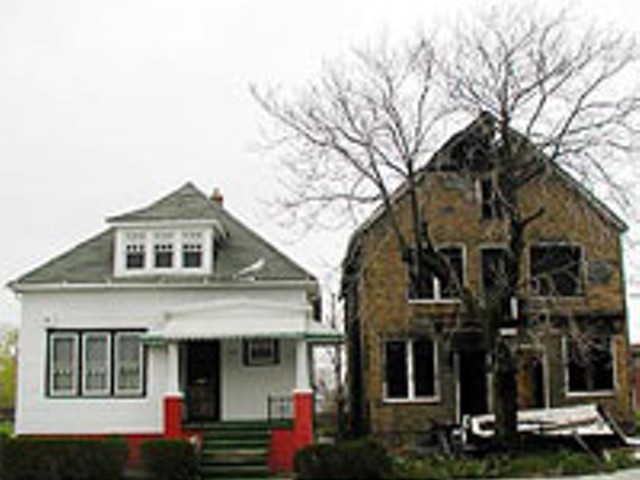Following years of fighting and costly speculation in the high-stakes gamble over casinos in Detroit, Mayor Kwame Kilpatrick last month put his cards on the table for a speedy end to the game. Newspaper headlines called his agreement to develop bigger gaming halls with hotels, theaters, stores, restaurants and a convention center a watershed success after former Mayor Dennis Archer spent four years on a failed bid to move the casinos to the riverfront.
Kilpatrick’s deal allows Greektown and Motor City casinos to expand where they are in scaled-down versions of the mega-complexes once planned; MGM Grand has not yet announced its development plans. And the city gets to keep $150 million worth of land that the casinos bought on the riverfront.
In exchange, the casinos agree to pay a total of $102 million to the city over the next two years, which Kilpatrick says is vital to bail out the city from its $95 million deficit.
Now, with an April 30 deadline on the deal looming and the city’s financial solvency hanging in the balance, City Council members and some city insiders are raising serious concerns about Kilpatrick’s proposal. On Monday, City Council adopted resolutions asking the mayor and the casinos to extend the deadline until June 30. Council President Maryann Mahaffey says there is no way the council can take action on the mayor’s plan right now.
“What we have is sketchy,” says Mahaffey of Kilpatrick’s deal. “It wipes out requirements and it’s a considerable loss in investment in the city, which is a loss to us, and there are huge holes in what we have been given so far. I think it’s a bad deal, because it sets us back.”
Kilpatrick’s agreement with the three casinos and internal City Council analyses show that millions of dollars in investments and heavy government oversight of casino design, construction and operation were removed from the new deal. Namely, Kilpatrick erased a mandate for the casinos to spend $1.6 billion on state-of-the-art, Las Vegas-style gambling complexes and whittled down building, employment and investment requirements, such as halving the number of hotel rooms each casino must construct from 800 to 400. That alone will save the casinos at least $16 million each in construction costs, according to the documents, and greatly reduce tax revenue for the city.
Kilpatrick was not available for comment on the agreement, and casino representatives declined to address council’s issues. But Greg Bowens, who served as Archer’s spokesman during the push for riverfront gaming halls, says expanding the existing temporary casinos is “a poor second cousin to what we could have had.
“What we’re talking about now compared to what was planned is the difference between a hot dog stand and Opus One or the Caucus Club, that’s what we’re talking about.”
Some City Council members agree, saying Kilpatrick is letting the casinos off easy.
“This deal is not good,” says Councilwoman Kay Everett. “That $102 million is chump change compared to the amount of money the casinos are taking in on a monthly and daily basis.”
Last year, the three casinos grossed $1 billion in Detroit and sent $100 million in taxes to city coffers. The casinos are Detroit’s largest taxpayer.
So far, much of Kilpatrick’s agreement, as released to the council, is vague. The complete development deal is expected this week, though it was promised in early April.
Council, which must approve or reject the deal, forwarded more than 160 questions to Kilpatrick’s office.
“We’re still waiting for answers,” says Councilwoman Sheila Cockrel.
The final document may address the council’s concerns, but sources in City Council say they aren’t holding their breath. The main problem with the new deal, it seems, is its laissez-faire attitude toward permanent casino development. The former agreement guided every inch and iota of casino growth, which many believe hindered Archer’s efforts to strike a final deal.
Archer’s agreement was so specific, in fact, it stated that MGM Grand would spend no less than $600 million to build a casino based on the MGM Grand in Las Vegas; Motor City and Greektown would spend no less than $480 million and $519 million, respectively, to fashion casinos after Vegas’ Monte Carlo Casino. It included a special casino zoning district to require traffic studies and minimum parking spaces and to ensure the casinos mesh with and enhance the surrounding community. It gave the city approval powers over all casino management agreements, and required more than $75 million in investments for local and minority business development. Further, it allowed the city to audit casino books and records, and required the casinos to spend $1 million each on an advisory board to oversee minority hiring and employment issues.
According to the documents, each of these requirements was eliminated.
“My first concern is the original document provided a series of checks and balances and safeguards to protect the city’s interest and the public’s interest,” says Cockrel. The agreement made sure the casinos would become “first-class destinations” and that they wouldn’t harm the neighboring communities.
“I haven’t seen any assurances in the new agreements that the permanent developments will be destination casinos, as opposed to local regional ones.”
Cockrel says the problem with local casinos is that they will bleed entertainment dollars from other local business, from malls to the Red Wings, as opposed to bringing in tourists’ dollars.
Cockrel said she supported gaming in the first place “to bring new money and new capital into the economy.”
The issue of Detroit’s casinos — where they’ll sit, how they’ll operate, who they’ll cater to, who’ll own them and how much they’ll invest — was the most controversial public debate during Archer’s tenure and sparked a failed attempt to recall him.
Casinos were illegal in Michigan (except on Native American land), until 1996, when a statewide referendum narrowly passed to change the state Constitution and allow three casinos in Detroit. In 1994, after three earlier votes failed, Detroiters said yes to gaming, precipitating the statewide vote. Reports of $1 million a day from Michigan going into the Windsor Casino buoyed the city’s decision.
Following the statewide referendum, the conservative state Legislature balked at changing the law to allow gaming in Detroit. Meanwhile, casino lobbyists claimed tourists would come from all over to spend money in city casinos, sending $300 million a year in taxes to Detroit’s lean coffers. Detroit bet on the promise in a deal that cut city income taxes and reduced state tax dollars sent back to Detroit. In 2000, an economist told City Council that Detroit is losing more on its tax deal with Lansing than it makes in casino taxes on the temporary facilities.
And today, eight years after Detroiters OK’d casinos, there is an urgency about the new deal. The city committed to 18,600 hotel rooms within an hour’s drive of the new Ford Field as part of its agreement with the National Football League to host Super Bowl 2006. Kilpatrick’s casino agreement requires the 1,200 casino hotel rooms be completed by December 2005. Further, the city needs the tax revenue from the expanded facilities and construction activities to feed its budget.
Moreover, the city’s lawyers argue that a permanent, signed casino deal and summer construction plans will help Detroit on another front. In January, a federal appeals court ruled that the method Archer used to grant casino licenses was unconstitutional because he gave preferences to groups that lobbied to legalize gambling. Now, the case is back before U.S. District Court Judge Robert Bell. On May 1, the city will argue Detroit’s licenses should not be considered null and void, because 8,000 people are gainfully employed and Detroit depends on the casinos. In court documents, the city states that rebidding the casino ownership, as requested by plaintiffs in the case, the tiny Lac Vieux Tribe of Chippewa Indians, would cause great harm to the city.
This week, the council expects to get the final development agreement. That’s a major problem, says Cockrel, because the government is in the throes of hammering out the city’s $3.3 billion budget. It will be difficult for the council to review the document fully by the end of the month, which is why the resolution was passed asking for an extension.
And to add confusion to the situation, Detroit businessman Don Barden on Monday announced his own casino plan. The millionaire, who tried to get Archer recalled after the mayor rejected his advances for a casino contract, wants the city to rebid the existing casino licenses. Barden and investors would bid to take over one gaming hall, and the new development agreements would include an additional 600 hotel rooms and increase investment to the city by hundreds of millions of dollars.
As of Monday, it was unclear what the administration’s response to the council’s extension and Barden’s proposal will be. Regardless of Barden’s pitch, if the mayor and the casinos don’t agree to extend the deadline, the existing agreement will expire and the state gaming board could shut down the casinos.
Despite the drama in City Council over the whole affair, nobody, save Michigan’s most intense casino foes, wants that to happen.
“I don’t think any of the casinos are interested in walking away from this market,” says Cockrel. “They’ve been successful beyond anyone’s wildest imagination.”
Lisa M. Collins is a staff writer for Metro Times. E-mail comments to [email protected]




